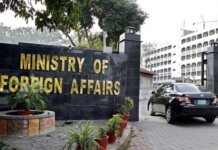Pakistan’s ongoing quest for political stability necessitates implementing effective measures within the system to disrupt the continuous cycle of political turmoil and polarization.
The nation finds itself once again entangled in the intricacies of domestic politics, a pattern that has persisted throughout its history. Even from its inception under the leadership of Mohammad Ali Jinnah to the removal of PTI chief Imran Khan, achieving political stability in Pakistan has remained elusive for the past 75 years. Recent events, such as the arrest of Imran Khan, have further exacerbated the political landscape.
Regrettably, instead of focusing on restoring order, our leaders are engaged in retaliatory politics, rendering the pursuit of political stability in Pakistan akin to pursuing an illusionary prospect.
Pakistan’s quest for survival, marred from birth, has been marked by intrigue and uncertainty. Throughout its political history, Pakistan’s democratic system has experienced fluctuations between civilian and military governments, primarily due to political instability, corruption, terrorism, and civil-military conflicts. These challenges have resulted in multiple martial laws in the country’s history.
Democracy in Pakistan has never functioned effectively, with no elected government completing its full tenure in history. From 1947 to 1958, seven Prime Ministers of Pakistan either resigned or were ousted, ultimately leading to a military takeover.
Following the tragic separation of East and West Pakistan, popular leader Zulfiqar Ali Bhutto refused to accept the results of the 1970 general elections. Although Bhutto’s tenure brought some political stability, it was short-lived and ended in 1977.
The pursuit for political stability persisted, with Pakistan consistently performing weakly in the Political Stability Index according to data from the World Bank. The average value for Pakistan from 1996 to 2021 was -2.09 points, indicating a weak performance in the index. In the 2021 Political Stability Index, Pakistan ranked 181 out of 194 countries, with a score of -1.67. It is worth noting that these statistics may have further deteriorated following the ouster of Prime Minister Imran Khan.
The perpetual cycle of political instability persists, and its exacerbation is likely with the arrest of Imran Khan, the leader of the PTI. Consequently, this development has incited a surge of public anger, intensifying the existing polarization. The nation has already endured significant hardships in the past, and the prevailing political climate suggests that it may face even greater challenges in the future.
While the country grapples with these difficulties, it appears that politicians and institutions have become embroiled in a power struggle, vying for control over Pakistan. Moreover, the stakes have never been higher, with the economy teetering on the brink of collapse, society deeply divided, numerous individuals still recovering from devastating floods, escalating terror attacks, and an unprecedented surge in inflation.
Nevertheless, the pursuit of retribution prevails over addressing these deficiencies. Many commentators and experts contend that the present political situation in Pakistan is unparalleled, and they harbor doubts about the prospects for attaining political stability in the country.
Michael Kugelman, Director of the South Asia Institute at the Wilson Center, emphasizes that Pakistan cannot afford to dismiss the current political crisis as a mere distraction with the assumption that normalcy will eventually be restored. Instead, Pakistan must fundamentally transform its governance approach to achieve elusive political stability. Failure to do so would result in dire consequences that may lead to the eventual collapse of the state.
It is imperative for Pakistan to make decisive choices at this critical juncture in order to alter the prevailing circumstances in its favor. Presently, Pakistan finds itself in urgent need of remedial measures. Consequently, it must prioritize the abandonment of retaliatory politics and direct its attention towards implementing viable strategies that can stabilize the nation. Therefore, it is crucial for all political parties to convene and formulate a code of conduct to govern political competition, while embracing the spirit of national reconciliation to resolve political conflicts through compromise.
Rather than engaging in politics driven by vengeance, political leaders must transform it into a harmonious form of governance, wherein the national interest takes precedence. Furthermore, the government must ensure the nation’s security by formulating sound policies, and refraining from engaging in populist propaganda and empty slogans aimed at garnering shallow popularity, which would come at the expense of national interests.
Moreover, institutions alone cannot rectify the nation’s condition; individuals in Pakistan must step forward and wholeheartedly contribute to steer the country in the right direction. Finally, with general elections scheduled for this year, it is crucial that they are not delayed under any circumstances, as this moment will be decisive in determining the country’s path towards stability.
Hence, it is indisputable that the presence of political instability within Pakistan serves as the primary cause for the entirety of our vulnerabilities. Consequently, it is imperative for all stakeholders to proactively take decisive actions, in order to prevent political stability from becoming an unattainable aspiration.
*The author’s is currently enrolled in the Master’s degree program of International Relations at the University of Karachi. He usually writes on political developments occurring across the world.
**The views expressed in this article are those of the author and do not necessarily reflect the views of The Diplomatic Insight. The organization neither endorses nor assumes any responsibility for the content of this article.
The Diplomatic Insight is a digital and print magazine focusing on diplomacy, defense, and development publishing since 2009.







